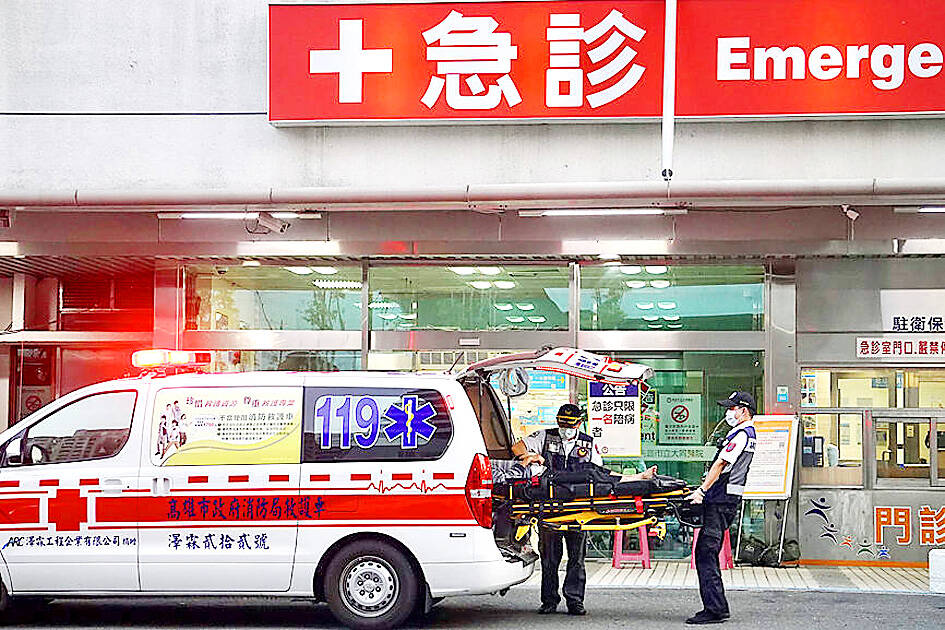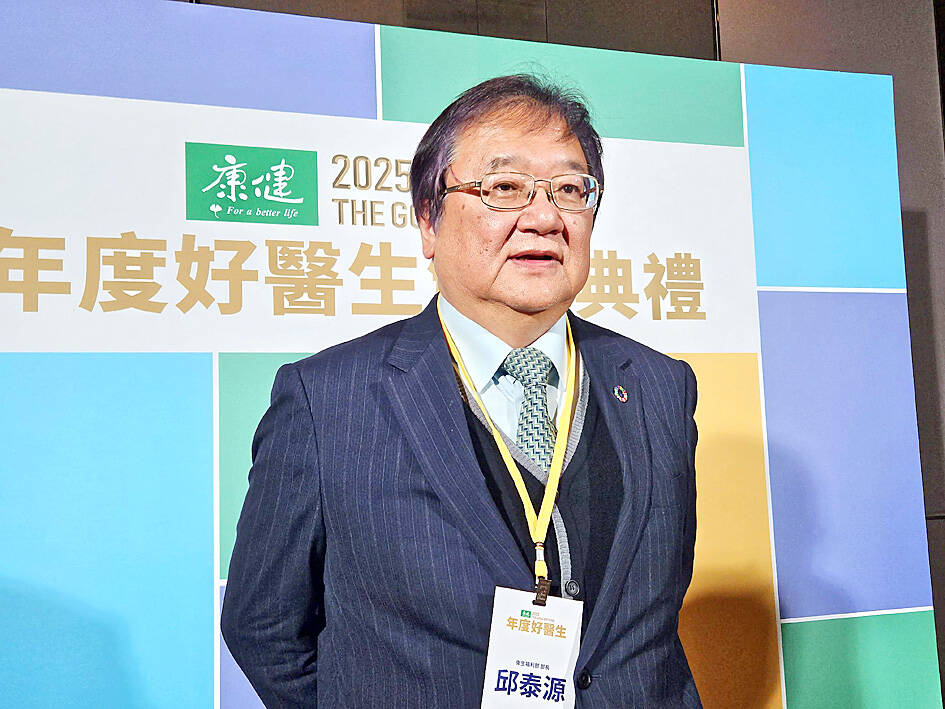The government must take action to relieve unprecedented overcrowding in hospital emergency rooms (ER), the Taiwan Society of Emergency Medicine said on Saturday.
The group said in a statement that if the problem worsens it could lead to the resignation of emergency medical workers, which would affect patient safety and healthcare quality, and weaken the nation’s healthcare capacity.
There are too many people in emergency rooms who are not being transferred after being admitted, forcing critically ill people to remain in ERs, the group said.

Photo: CNA
The root cause is insufficient inpatient beds, which could be due to a nursing shortage, forcing hospitals to close off beds or maintain an imbalanced or insufficient allocation of beds, it said.
In the short term, the government could require hospitals to open beds in other departments to more flexibly admit patients when ERs are overcrowded, which would improve the management of beds in intensive care units to ensure reasonable allocation, it said.
Hospitals should also increase the number of emergency medical staff when ERs are overcrowded, which would improve the quality of healthcare and help prevent burnout, it said, adding that hierarchical diagnosis and treatment systems should be better implemented.

Photo: CNA
Long-term solutions include setting up and funding an ER emergency situation response mechanism, so that hospitals can collaborate in solving the problem, the association said.
The government should also consider adjusting the National Health Insurance payment for ER visits to encourage hospitals to admit critically ill patients and ensure their safety, it said.
Other solutions include promoting alternative options for ER hospitalization, such as acute hospital care at home programs or outpatient parenteral antibiotic therapy models, it said, adding that the government should also set up a mechanism to monitor the number of available inpatient or ER hospital beds, so it can adjust policies and resource allocation.
Minister of Health and Welfare Chiu Tai-yuan (邱泰源) yesterday thanked the Taiwan Society of Emergency Medicine for its suggestions and ER medical personnel for their hard work.
The ministry has gathered local health department officials, representatives of medical centers and physicians’ associations to discuss ER overcrowding, Chiu said.
The ministry has asked hospitals to readjust the proportion of inpatient and ER beds, to hopefully add more ER beds, he said.
However, it would be a challenging task for hospital superintendents, as many people require hospitalization, he said.
The ministry has also asked hospitals to increase ER personnel levels to ease their workload and pressure, while the ministry would continue to work with the National Health Insurance Administration on how to retain ER staff, through better wages or other methods, he said.
Chiu said the ministry and physicians’ associations have been promoting hierarchical diagnosis and treatment systems, encouraging people with mild symptoms of illnesses such as influenza to first seek medical attention at clinics or local hospitals, and go to larger hospitals through referrals.
Additional reporting by CNA

SECURITY: As China is ‘reshaping’ Hong Kong’s population, Taiwan must raise the eligibility threshold for applications from Hong Kongers, Chiu Chui-cheng said When Hong Kong and Macau citizens apply for residency in Taiwan, it would be under a new category that includes a “national security observation period,” Mainland Affairs Council (MAC) Minister Chiu Chui-cheng (邱垂正) said yesterday. President William Lai (賴清德) on March 13 announced 17 strategies to counter China’s aggression toward Taiwan, including incorporating national security considerations into the review process for residency applications from Hong Kong and Macau citizens. The situation in Hong Kong is constantly changing, Chiu said to media yesterday on the sidelines of the Taipei Technology Run hosted by the Taipei Neihu Technology Park Development Association. With

‘FORM OF PROTEST’: The German Institute Taipei said it was ‘shocked’ to see Nazi symbolism used in connection with political aims as it condemned the incident Sung Chien-liang (宋建樑), who led efforts to recall Democratic Progressive Party (DPP) Legislator Lee Kun-cheng (李坤城), was released on bail of NT$80,000 yesterday amid an outcry over a Nazi armband he wore to questioning the night before. Sung arrived at the New Taipei City District Prosecutors’ Office for questioning in a recall petition forgery case on Tuesday night wearing a red armband bearing a swastika, carrying a copy of Adolf Hitler’s Mein Kampf and giving a Nazi salute. Sung left the building at 1:15am without the armband and apparently covering the book with a coat. This is a serious international scandal and Chinese

A US Marine Corps regiment equipped with Naval Strike Missiles (NSM) is set to participate in the upcoming Balikatan 25 exercise in the Luzon Strait, marking the system’s first-ever deployment in the Philippines. US and Philippine officials have separately confirmed that the Navy Marine Expeditionary Ship Interdiction System (NMESIS) — the mobile launch platform for the Naval Strike Missile — would take part in the joint exercise. The missiles are being deployed to “a strategic first island chain chokepoint” in the waters between Taiwan proper and the Philippines, US-based Naval News reported. “The Luzon Strait and Bashi Channel represent a critical access

COUNTERINTELLIGENCE TRAINING: The ministry said 87.5 percent of the apprehended Chinese agents were reported by service members they tried to lure into becoming spies Taiwanese organized crime, illegal money lenders, temples and civic groups are complicit in Beijing’s infiltration of the armed forces, the Ministry of National Defense (MND) said in a report yesterday. Retired service members who had been turned to Beijing’s cause mainly relied on those channels to infiltrate the Taiwanese military, according to the report to be submitted to lawmakers ahead of tomorrow’s hearing on Chinese espionage in the military. Chinese intelligence typically used blackmail, Internet-based communications, bribery or debts to loan sharks to leverage active service personnel to do its bidding, it said. China’s main goals are to collect intelligence, and develop a